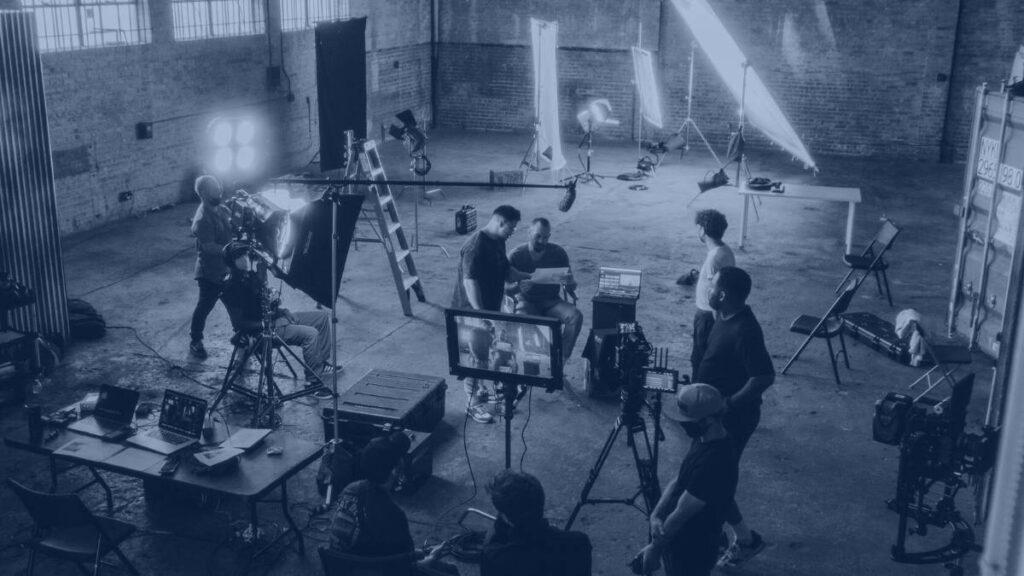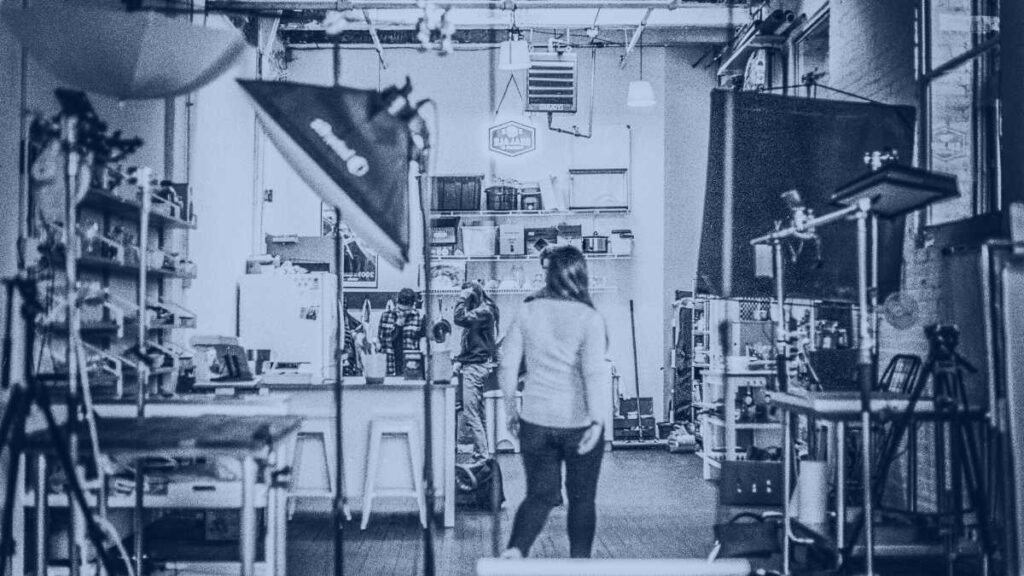
Film production insurance offsets liability, secures your production company and protects your employees. Having general liability and production insurance is an essential part of producing a successful film or show while avoiding the pitfalls of exposure to liability.
In fact, film production insurance and general liability insurance is often required by your rental house, payroll company, bond company and banks who facilitate debt financing for the film. Even some scrupulous financiers will require proof of insurance before completing equity financing.
The necessary production insurance is a mix of insurance policies. Including general liability, equipment, workers’ comp, errors and omissions, and specialty insurance. Each has a premium and most have a deductible. All adding up to about 2.5% of the film or show’s budget, depending on budget size.
We will explain each type of insurance, how much is normal, for how long and more.
Want to learn more? Reach out!
Jump To
- Do I need general liability insurance for my film production?
- Does general liability cover automobile accidents?
- Do I need umbrella insurance?
- Do I need insurance for film equipment rentals?
- What is workers’ compensation insurance?
- What is errors and omissions insurance a.k.a. E&O insurance?
- What types of specialty production insurance are available?
- COVID-19 Production Insurance
- Should I purchase short-term or long-term production insurance?
- What is a certificate of insurance (COI)?
- Where can I purchase general liability and production insurance?
- How can I fortify my production company against liability?
- Get covered with film production insurance
Do I need general liability insurance for my film production?
No matter the size of a production, you need general liability insurance to offset financial and legal risk for any potential property damage, bodily injury, personal and advertising injuries and products-completed operations aggregate.
Payroll companies, production bond companies, film offices that issue filming permits and lenders want the security offered by general liability insurance. They will demand you have it and in most cases deny service or a permit without it.
No one wants to be held financially or legally accountable for an accident resulting from your show or film production. You don’t want to deal with the liability either.
If you encounter injury or property damage, without the appropriate insurance, your production could get bogged down in legal fees and be forced to shut down. Keep the lights on and the camera running, buy insurance.
You might be wondering – how much?
Each production is different. Always consult a broker and thoroughly describe the specific needs of your film production.
What does commercial general liability insurance cover?
General liability insurance covers the defense and indemnity of a lawsuit if someone working for you causes a bodily injury or property damage to a third party.
Your policy will have several distinct parts that add up to cover a decent chunk of a production’s liability, designed to offset your film’s exposure to risk.
Note that general liability does not cover injuries experienced by your employees or damage to property that you own. It is designed to offset liability arising from people or property outside of your domain affected by your production.
Property damage can occur when the actions of a production result in physical damage to a leased filming location or studio. If you are unable to reach a deal with a location owner for settlement, they have the right to sue your production to cover the cost of repairs resulting from damages.
Bodily injury coverage protects you against lawsuits resulting from injuries sustained by people on or around set who aren’t directly employed by the film. Such as a property owner, bystander, or other third-party individual. This does not cover your employees in the event of an accident resulting in bodily injury.
Personal and advertising injuries protection can give you peace of mind for claims arising out of advertising your business and claims for libel or slander found within your advertising or website.
If you are trying to cover the content you are producing, you must purchase another type of insurance separately to cover these issues. E&O or errors and omissions insuranceis specifically designed to cover the legal issues that films face once they are on the market.
Products-completed operations aggregate will only be relevant to your production if you produce merchandise for the film or show. Generally, this isn’t included in production policies. Though, in the rare case that there is a physical product being sold to the public, ask your broker about this type of coverage.
What is a “per occurrence” limit?
A per occurrence limit is the dollar amount on an insurance policy that can be paid out for each instance of a covered claim.
Regardless of the number of people injured or amount of property damaged, if it resulted from one incident, that incident and everyone involved is covered up to the dollar amount of the policy you purchased.
For example, if two people are injured and a studio fixture breaks due to a faulty rig, a $2 million policy with a $1 million per occurrence limit will cover all the parties involved in that single incident up to $1 million. It will not cover each injured individual and the property owner up to $1 million each.
If a claim reaches over the $1 million per occurrence limit, that’s when umbrella insurance kicks in.

What is an “aggregate” limit?
An aggregate limit is the maximum amount to be paid within a policy period. On a policy that has a per occurrence limit of $1 million, the aggregate limit will typically be $2 million.
This means that if there are two occurrences in the same policy period, you will have $1 million available for each occurrence. If one claim doesn’t reach the $1 million mark, the amount of the claim will simply be deducted from the aggregate limit.
For example, a $500K claim will reduce a $2 million policy’s total coverage to $1.5 million. Once the aggregate limit is exhausted, you can no longer file claims on that insurance policy.
What is a “coverage area”?
Production insurance coverage area indicates the specific geographic locale or region in which an insurance policy’s benefits are in effect.
A U.S. insurance policy has a territory of the United States, Canada, Puerto Rico, and U.S. territories. This is yet another important aspect to consider when purchasing production insurance. If you are filming outside of this territory, you will need to arrange a foreign policy to cover those operations.
Does general liability cover automobile accidents?
Commercial auto insurance will need to be purchased separately from general liability. If your production owns vehicles, rents vehicles, or requires employees to drive their own vehicles, you must purchase automobile insurance for your production.
For example, the California Film Commission requires auto liability insurance with “owned, hired and non-owned” automobiles covered, “in an amount not less than $1,000,000 for each accident.” These are the basic minimum requirements a production needs to meet to obtain a film permit in CA.
Payroll companies that stand in as your employer of record will also require it, before commencing service, to offset liability in the event of an accident.
If an accident happens, your payroll company may receive the insurance claim. Since they require proof of auto liability insurance, they will send the claim to your production. Your production company will be held liable for the accident and must resolve the claim.
Do I need umbrella insurance?
Umbrella insurance is another way for a risk averse producer to retain additional coverage and add to a $1 million general liability and auto liability policy. Umbrella insurance can go as high as you would like and typically falls somewhere between $1 million and $10 million.
If your film requires especially risky stunts or complex rigs, for example, the upper limits of a general liability insurance and other types of film production insurance may not comfortably provide enough coverage in the event of an accident.
Without additional coverage, you may be at risk of exhausting your general liability or other production insurance policy, using up your contingency, or worse, bankrupting the film.
How does umbrella insurance work?
Umbrella insurance is designed to kick in when your primary insurance policy isn’t enough to cover a claim. If an on-set accident results in a lawsuit from a third party wherein the claimant is awarded $1.5 million by a court, the appropriate production insurance may only cover up to $1 million of the claim.
You are left to scramble to pay for the remaining $500K. A figure like this would most likely drain a contingency or bankrupt a small independent film.
Umbrella insurance dashes those worries. A $1 million umbrella policy would take care of the $500K difference. And, in most cases you won’t need to pay a deductible to activate the policy, as you already paid a deductible to activate the primary insurance claim.
The per occurrence limit and aggregate limit are always the same. With a $5 million policy, you can have a claim up to $5 million. If a claim falls short of that, you can submit multiple claims until the $5 million aggregate is exhausted.
Only a professional broker specifically providing insurance for film productions can evaluate your needs and make a recommendation. Always consult a production insurance professional before purchasing coverage.

Do I need insurance for film equipment rentals?
Professional production equipment rental houses will require that you insure their equipment from the moment you remove it from their premises to the moment you return the equipment.
Once you take possession of rented equipment, for the purposes of insurance, it is temporarily considered your equipment. You need to purchase equipment insurance, a coverage found on a production policy, to cover loss or damage to that equipment.
You will also need to furnish the rental company with a certificate of insurance or COI, listing their company as additional insured in the amounts required, before taking possession of any equipment.
Typically, your equipment insurance policy will have a $1 million limit. If you are renting equipment with values that exceed this, you can raise the limit on that policy.
Arri Rental’s Terms and Conditions, for example, requires you obtain an insurance policy based on the replacement cost of all rented equipment and must cover “all risk of loss or damage to equipment.” Their policy also notes the need for the inclusion of equipment theft from unattended vehicles.
Outside of the normally required insurance, some rental houses may also require certain amounts of specialty insurance based on where the equipment is going. Particularly if you plan on using the equipment outside of the United States or on specialty vehicles, such as aircraft or watercraft.
It is crucial you thoroughly inspect the equipment before removing it from the rental house. You are responsible for inspecting the equipment before removal, ensuring it is in working order and signing off to that effect.
If the equipment is returned in any other condition than the one you agreed to, you will be held liable. Regardless of whether you caused the damage.
What is workers’ compensation insurance?
Workers’ Compensation insurance provides employees who get injured working on set with wage and medical benefits. In exchange, crew members cannot sue the production for negligence.
In this way, an injured employee enjoys recovery time with benefits and pay, and you avoid paying for medical expenses and legal fees. You are paying for protection from drawn out legal battles and large out-of-pocket payouts.
Workers’ Compensation insurance is required by every state in the union – except Texas. If you are hiring employees, you must have it. Even if you are producing in Texas, it is recommended you carry workers’ compensation insurance to avoid the financial perils of a work-related injury.
When am I responsible for purchasing workers’ compensation insurance?
If you are hiring an employer of record payroll service, such as Media Services, worker’s compensation is always included in the overall price. However, if you are running payroll independently, you will be responsible for following state law and purchasing a workers’ compensation insurance policy.
A workers’ compensation insurance policy must cover all W-2 employees working on your film production.
Loan-out corporations and stakeholders of those corporations are also covered. Anyone that ends up on the payroll needs to be covered.
If someone is a legitimate 1099 independent contractor, you do not need to purchase a policy to cover these workers. They are responsible for maintaining their own policies. The same is true for volunteers.
Always consult your payroll service and broker before purchasing a workers’ compensation insurance policy independently. An entertainment payroll service will almost always administer the entirety of your workers’ compensation policy.
In certain cases, a small “shell” policy may be offered by your broker to cover incidentals.
For example, a producer may pay cash to someone who isn’t on the payroll to run errands. If that person gets injured on the run, they are technically working for that producer and are entitled to workers’ compensation. If someone is injured and decides to sue the production, the “employer’s liability” section of this shell policy could help cover the lawsuit.
How do I buy workers’ compensation insurance?
If you do need to purchase a policy independently, workers’ compensation insurance can be bought from an insurance broker or directly from a state, depending on where you are filming.
Four states – North Dakota, Ohio, Wyoming, and Washington – maintain monopolistic funds. Meaning you must apply for and purchase workers’ compensation insurance from the state.
The rest of the country operates in a competitive market for workers’ compensation insurance. You can buy a policy from the state fund or from a private insurer.
When employing an employer of record entertainment payroll service, you generally don’t need to worry about crossing state lines or purchasing a policy.
What is errors and omissions insurance a.k.a. E&O insurance?
Even the most diligent producer may run into a lawsuit thanks to a perceived copyright infringement or incorrectly placed screen credit. Errors and omissions insurance protects a film against those issues and others, including defamation, invasion of privacy, unauthorized use of trademarks or names, publicity infringement, piracy, and story theft.
This policy is designed to protect a film or show, typically for up to 3 years, from legal challenges that may arise after a film is released.
Most distributors won’t consider purchasing your film without an errors and omissions policy in place. They don’t want to be held liable if you unknowingly slipped up. Often, even financing may not come through until you’ve purchased a policy with the appropriate coverage for your film.
If you do end up in court, an errors and omissions policy will cover attorney’s fees and resulting liabilities, if any. The average policy will cover up to $1 million per occurrence and $3 million aggregate over a three-year period – the life of the policy.
If a covered event happens, you may have to pay a deductible out-of-pocket before the insurance kicks in. Another great reason to budget a contingency from the get-go as a failsafe.
The deductible and coverage amount can vary based on your individual film production’s needs. An insurer will often need to investigate all your film’s release forms, chain of title documents and copyright clearance reports before issuing coverage.
Always do your homework, organize your paperwork and consult a professional broker before purchasing a policy!
What types of specialty production insurance are available?
Your film production may demand certain special effects, vehicles, equipment, or stunts that require extra coverage not offered in the average mix of production insurance policies.
This is why it’s so important to get a customized plan based on the specific needs of your production.
If your production calls for particularly risky or complex stunts, the use of animals, aircraft or drones, watercraft or underwater filming, pyrotechnics or weapons, complex set builds, weather effects, picture cars or other risky variables you may need a specialty add-on to your production insurance policy.
Be sure to conduct a thorough breakdown of your script to gain an understanding of what’s at risk and where additional coverage may be necessary.
COVID-19 Production Insurance
Once claims started rolling in to cover production shutdowns due to COVID-19, insurance companies stopped covering disease and exposure to bacteria on sets. Even with limited options, it is still worth it to price policies that will cover pandemic-related shutdowns.
Such shutdowns can cost millions a day, and often illness forces a shutdown for over a week.
If you need to bond your film or show, our bonding partner offers a unique opportunity to procure COVID-19 protection as part of a bond. A 4-5% rate for such insurance comes standard with a Media Guarantors completion bond.
Should I purchase short-term or long-term production insurance?
Short and long term insurance differ in their lengths of coverage. Which policy you choose will be based on your production schedule and needs, as well as the number of separate projects you plan on executing in a given time period.
If you are only producing a single film or show, over the course of a weekend or several weeks, a short-term policy will do the job.
If you run a production company filming several projects over the course of a year, you will need long-term or annual enterprise-grade production insurance outfitted to meet your yearly needs. This will mean higher limits and a more expensive policy overall.
What is a certificate of insurance (COI)?
A certificate of insurance is a document issued by an insurance broker proving the viability of your various production insurance policies.
Several stakeholders will require you to prove insurance coverage and a COI will do just that. This is also where your proof of additional insured will appear.
It is important that you can provide a COI. Leased locations, equipment rental houses, payroll services and others will need to be listed as additional insured and keep a copy of your COI on file.
This ensures that, against all odds, if a lawsuit does name a rental house or payroll company, they too are covered by your insurance policies. A verified COI provides confidence that work can commence between your production and service providers.
How can I fortify my production company against liability?
While insurance is a necessary and important part of producing a film or show, here are some steps you can take to avoid triggering a claim and being forced to dip into your contingency to cover deductibles.
Before production begins, invest in rights clearance. Having a film clearance service evaluate the script you intend to produce is critical to avoid copyright infringement or personal damages. Many distributors will require clearance before purchasing a film.
Always consult an entertainment lawyer before distributing contracts or signing contracts. By having iron clad legal documents in place from day one, you can outmaneuver complicated lawsuits involving contracts.
Consider your options when forming a business entity for a film. Choosing the appropriate business structure for your film or production company can be critical. An LLC offers considerable protection from personal liability for the actions of your film production. A general partnership, on the other hand, will expose you to considerable personal risk. Choose your business structure wisely.
By laying legally sound groundwork ahead of financing your film, hiring crew members, committing talent, renting gear or signing lease agreements you can rest easy knowing you did everything possible to avoid legal conflict and triggering an insurance claim.
Get covered with film production insurance
You put a lot of work into making your production happen, protecting that work should be a no-brainer. Getting the right insurance policies in place are key to offsetting liability, avoiding expensive legal battles and protecting your employees.
Having the right policies in place can affect everything from financing to payroll – Including distribution. Always talk to a broker, they can help you choose the right package for your project. When the time comes to start production or sell your film, you can rest assured you are protected.
